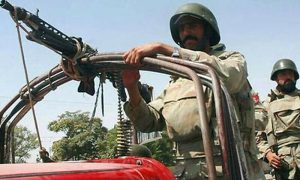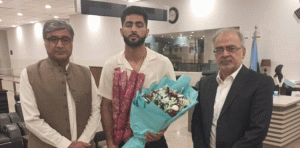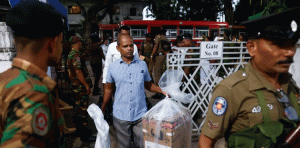

Ismail Haniyeh, the Hamas leader who was killed in Iran, was the tough-talking face of the Palestinian group’s international diplomacy as conflict raged back in Gaza, where three of his sons were killed in an Israeli airstrike.
But despite the rhetoric, he was seen by many diplomats as a moderate compared to the more hardline members of the Iran-backed group inside Gaza.
Appointed to the Hamas top job in 2017, Haniyeh moved between Turkey and Qatar’s capital Doha, escaping the travel curbs of the blockaded Gaza Strip and enabling him to act as a negotiator in ceasefire talks or to talk to Hamas’ ally Iran.
“All the agreements of normalisation that you (Arab states) signed with (Israel) will not end this conflict,” Haniyeh declared on Qatar-based Al Jazeera television shortly after Hamas fighters launched the October 7 raid.
Israel’s response to the strike has been a military campaign that has killed more than 35,000 people inside Gaza so far, according to health authorities in the territory.
Sons killed in airstrike
Three of Haniyeh’s sons — Hazem, Amir, and Mohammad — were killed on April 10 when an Israeli air strike struck the car they were driving, Hamas said. Haniyeh also lost four of his grandchildren, three girls and a boy, in the attack, Hamas said.
Haniyeh had denied Israeli assertions that his sons were fighters for the group, and said “the interests of the Palestinian people are placed ahead of everything” when asked if their killing would impact truce talks.
For all the tough language in public, Arab diplomats and officials had viewed him as relatively pragmatic compared with more hardline voices inside Gaza, where the military wing of Hamas planned the Oct 7 attack.
While telling Israel’s military they would find themselves “drowning in the sands of Gaza”, he and his predecessor as Hamas leader, Khaled Meshaal, had shuttled around the region for talks over a Qatari-brokered ceasefire deal with Israel that would include exchanging hostages for Palestinians in Israeli jails as well as more aid for Gaza.
Israel regards the entire Hamas leadership as “terrorists”, and has accused Haniyeh, Meshaal, and others of continuing to “pull the strings of the Hamas terror organisation”.
But how much Haniyeh knew about the Oct 7 assault beforehand is not clear. The plan, drawn up by the Hamas military council in Gaza, was such a closely guarded secret that some Hamas officials seemed shocked by its timing and scale.
Yet Haniyeh, a Sunni Muslim, had a major hand in building up Hamas’ fighting capacity, partly by nurturing ties with Shi’ite Muslim Iran, which makes no secret of its support for the group.
During the decade in which Haniyeh was Hamas’ top leader in Gaza, Israel accused his leadership team of helping to divert humanitarian aid to the group’s military wing. Hamas denied it.
Shuttle diplomacy
When he left Gaza in 2017, Haniyeh was succeeded by Yahya Sinwar, a hardliner who spent more than two decades in Israeli prisons and whom Haniyeh had welcomed back to Gaza in 2011 after a prisoner exchange.
“Haniyeh is leading the political battle for Hamas with Arab governments,” Adeeb Ziadeh, a specialist in Palestinian affairs at Qatar University, said before his death, adding that he had close ties with more hardline figures in the group and the military wing.
“He is the political and diplomatic front of Hamas,” Ziadeh said.
Haniyeh and Meshaal had met officials in Egypt, which has also had a mediation role in the ceasefire talks. Haniyeh travelled in early November to Tehran to meet Iran’s supreme leader Ayatollah Ali Khamenei, Iranian state media reported.
Three senior officials told Reuters that Khamenei had told the Hamas leader in that meeting that Iran would not enter the war having not been told about it in advance. Hamas did not respond to requests for comment before Reuters published its report, and then issued a denial after its publication.
As a young man, Haniyeh was a student activist at the Islamic University in Gaza City. He joined Hamas when it was created in the First Palestinian intifada (uprising) in 1987. He was arrested and briefly deported.
Haniyeh became a protégé of Hamas’ founder Sheikh Ahmad Yassin, who like Haniyeh’s family, was a refugee from the village of Al Jura near Ashkelon.
In 1994, he told Reuters that Yassin was a model for young Palestinians, saying: “We learned from him love of Islam and sacrifice for this Islam and not to kneel down to these tyrants and despots.”
By 2003 he was a trusted Yassin aide, photographed in Yassin’s Gaza home holding a phone to the almost completely paralysed Hamas founder’s ear so that he could take part in a conversation. Yassin was assassinated by Israel in 2004.
Haniyeh was an early advocate of Hamas entering politics. In 1994, he said that forming a political party “would enable Hamas to deal with emerging developments”.
Initially overruled by the Hamas leadership, it was later approved and Haniyeh become Palestinian prime minister after the group won Palestinian parliamentary elections in 2006 a year after Israel’s military withdrew from Gaza.
The group took control of Gaza in 2007.
In 2012, when asked by Reuters reporters if Hamas had abandoned the armed struggle, Haniyeh replied “Of course not” and said resistance would continue “in all forms — popular resistance, political, diplomatic and military resistance”.






